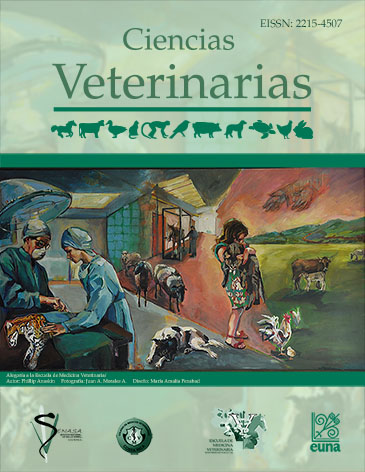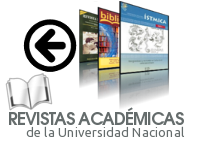Short Communication: First report of the trematode Platynosomum illiciens (Trematoda: Digenea>/i>) in Felis catus in Costa Rica, Central America
DOI:
https://doi.org/10.15359/rcv.39-1.1Keywords:
Central America, trematode, Digenea, felineAbstract
This paper is the first description of the trematode P. illiciens found in a domestic feline (Felis catus) in Costa Rica, detected as an incidental finding at necropsy. The cat’s carcass was accepted for a necropsy in the Pathology Service of the Veterinary Medicine School of the National University, Costa Rica. However, the origin and clinical history of this cat are unknown. Adult P. illiciens flukes were detected in the feline’s gallbladder. Species identification was conducted by morphological characterization and molecular sequencing analysis. Assessing the possible foci of this trematode in the country could be a useful tool to understand its cycle in Costa Rican mammals and birds and consider it as an organism capable of infecting and affecting the domestic feline population in the country.
References
Blair, D., Agatsuma, T., Watanobe, T., Okamoto, M. & Ito, A. (1997). Geographical genetic structure within the human lung fluke, Paragonimus westermani, detected from DNA sequences. Parasitology, 115(4), 411-417. doi: 10.1017/S0031182097001534
Bowles, J., Blair, D. & McManus, D.P. (1995). A molecular phylogeny of the human schistosomes. Molecular Phylogenetics and Evolution., 4(2), 103-109. doi: 10.1006/mpev.1995.1011
Bowman, D.D. (2014). Georgi’s Parasitology for Veterinarians (10th Edition). Elsevier, Missouri.
Brenes, R.R. & Arroyo, G. (1962). Helmintos de la República de Costa Rica XX: Algunos tremátodos de aves silvestres. Revista de Biología Tropical, 10(2), 205-227.
Gomes de Oliveira, M.C., Pereira, S.A., Peixoto, T.M., Rocha, S., Martins, R., da Silva, R.A., Silva, T., Ferreira, F.E. & Dias, H. (2019). Infection by Platynosomum illiciens (= P. fastosum) in domestic cats of Araguína, Tocantins, northern Brazil. Revista Brasileira de Parasitologia Veterinária., 28(4), 786-789. doi: 10.1590/s1984-29612019070
Henderson, C.L. (2010). Birds of Costa Rica: A field guide. University of Texas Press, United States.
Lenis, C., Navarro, J.F. & Velez, I. (2009). First case of platinosomosis from Colombia: Platynosomum illiciens (Digenea: Dicrocoeliidae) in Felis catus, Turbo, Antioquia. Revista Colombiana de Ciencias Pecuarias, 22(4), 659-66.
Nguyen H.M., Van Hoang H. & Ho, L.T. (2017). Platynosomum fastosum (Trematoda: Dicrocoeliidae) from cats in Vietnam: morphological redescription and molecular phylogenetics. Korean Journal of Parasitology, 55(1), 39–45. doi: 10.3347/kjp.2017.55.1.39
Pinto, H.A., Mati, V.L. & Melo, A.L. (2014). New insights into the life cycle of Platynosomum (Trematoda: Dicrocoeliidae). Parasitology Research, 113(7), 2701-2707. doi: 10.1007/s00436-014-3926-5
Pinto, H.A, Mati, V.L. & Melo, A.L. (2016). Can the same species of Platynosomum (Trematoda: Dicrocoeliidae) infect both mammalian and avian hosts? Journal of Helminthology, 90(3), 372–376. doi: 10.1017/S0022149X15000152
Pinto, H.A., Pullido-Murillo, E.A., Braga, R.R., Mati, V.L.T., Melo, A. L. & Tkach, V.V. (2018). DNA sequences confirm low specificity to definitive host and wide distribution of the cat pathogen Platynosomum illiciens (= P. fastosum) (Trematoda: Dicrocoeliidae). Parasitology Research, 117(6), 1975-1978. doi: 10.1007/s00436-018-5866-y
Pojmańska, T. (2008). Family Dicrocoeliidae Looss, 1899. In: Bray, R.A., Gibson, D.I. & Jones, A. (Eds.). Keys to the Trematoda (Volume 3, pp. 233–260). CAB International and Natural History Museum, London.
Salomão, M., Souza-Dantas, L.M., Mendes-de-Almeida, F., Branco, A.S., Bastos, O.P.M., Sterman, F. & Labarthe, N. (2005). Ultrasonography in hepatobiliary Evaluation of domestic cats (Felis catus, L., 1758) infected by Platynosomum Looss, 1907. The International Journal of Applied Research in Veterinary Medicine, 3(3), 271-279.
Sugiyama, H., Singh, T.S. & Rangsiruji, A. (2013). Paragonimus. In: Liu, D.Y. (Ed.). Detection of Human Parasitic Pathogens (pp. 423-436). CRC Press, Florida, USA.
Downloads
Published
How to Cite
Issue
Section
License
Licensing of articles
All articles will be published under a license:

Licencia Creative Commons Atribución-NoComercial-SinDerivadas 3.0 Costa Rica.
Access to this journal is free of charge, only the article and the journal must be cited in full.
Intellectual property rights belong to the author. Once the article has been accepted for publication, the author assigns the reproduction rights to the Journal.
Ciencias Veterinarias Journal authorizes the printing of articles and photocopies for personal use. Also, the use for educational purposes is encouraged. Especially: institutions may create links to specific articles found in the journal's server in order to make up course packages, seminars or as instructional material.
The author may place a copy of the final version on his or her server, although it is recommended that a link be maintained to the journal's server where the original article is located.
Intellectual property violations are the responsibility of the author. The company or institution that provides access to the contents, either because it acts only as a transmitter of information (for example, Internet access providers) or because it offers public server services, is not responsible.







